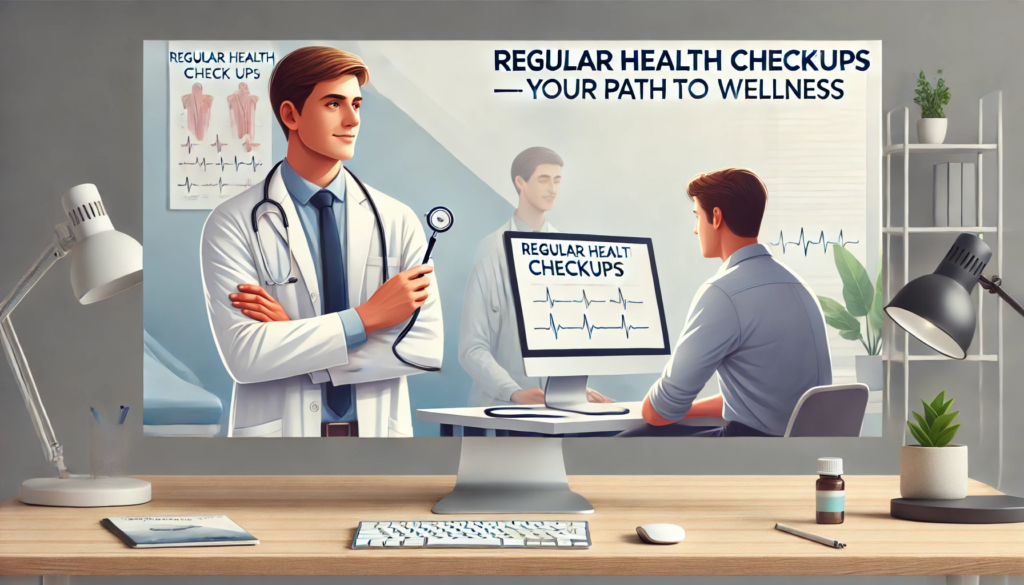Health is undoubtedly one of the most valuable assets anyone can possess. Despite this, many people neglect to prioritize their health, often waiting for an illness or discomfort to push them toward seeking medical attention. This reactive approach, while understandable, is not the most effective. Regular health checkups are crucial for maintaining long-term well-being and preventing serious health issues down the line.
A regular health checkup is an essential part of a proactive approach to health, enabling early detection of potential health problems, thus allowing for timely intervention. In this blog, we will explore the significance of regular health checkups, the various types of screenings and tests that should be part of routine checkups, and the benefits of maintaining a schedule for health assessments.
Why Are Regular Health Checkups Important?
Health checkups play a critical role in safeguarding your health, as they can detect hidden health conditions that might not yet show symptoms. While it’s easy to assume that if you’re feeling fine, your health is in good shape, many conditions are asymptomatic in their early stages. For instance, high blood pressure, high cholesterol, or certain types of cancer often don’t display symptoms until they’ve progressed significantly. Regular checkups can identify these conditions early, making them more manageable and easier to treat.
Benefits of Regular Health Checkups
- Early Detection of Diseases One of the biggest advantages of regular health checkups is the early detection of diseases. Many health problems, such as diabetes, hypertension, and certain cancers, do not show clear signs until they have advanced. A regular checkup helps identify these conditions at their earliest stages, improving the chances of successful treatment and even prevention in some cases.
- Prevention is Better than Cure A key reason to get regular health checkups is that they focus not just on diagnosing existing conditions but also on preventing potential health issues. By monitoring risk factors and making lifestyle changes, many conditions can be prevented or delayed. A healthcare provider can give guidance on diet, exercise, smoking cessation, and stress management, which can all lower the risk of future illnesses.
- Building a Relationship with Your Healthcare Provider Regular health checkups allow you to build a relationship with your healthcare provider. This trust enables them to better understand your health needs and provide personalized advice. Additionally, it helps your healthcare provider monitor any ongoing health issues or trends in your health, offering them more context when addressing any concerns you may have.
- Updating Vaccinations and Preventive Screenings Routine checkups also ensure that you’re up-to-date on essential vaccinations and preventive screenings. Many vaccines, such as the flu shot, tetanus boosters, and others, need to be administered periodically. Similarly, preventive screenings like mammograms, pap smears, cholesterol checks, and colonoscopies are important tools in maintaining your health.
- Mental Health Monitoring Mental health is just as important as physical health. During a regular checkup, your healthcare provider may assess your mental well-being, discussing issues such as stress, depression, or anxiety. Addressing mental health concerns early is crucial for overall health, as mental health issues often go unnoticed until they become more severe.

Common Tests and Screenings During a Regular Health Checkup
The specific tests and screenings you need will depend on various factors, such as your age, gender, medical history, and risk factors. However, here are some common tests and screenings that are generally recommended during a regular health checkup:
1. Blood Pressure Screening
High blood pressure is a leading cause of heart disease and stroke, and it often has no symptoms. Checking blood pressure regularly can help detect hypertension early and prevent complications.
2. Blood Tests
Blood tests are essential in checking for conditions like high cholesterol, diabetes, liver function, and kidney function. The most common blood tests include:
- Complete Blood Count (CBC)
- Lipid Profile (cholesterol and triglyceride levels)
- Blood Glucose Levels
3. Cancer Screenings
Depending on your age and gender, cancer screenings such as mammograms (for breast cancer), Pap smears (for cervical cancer), and colonoscopies (for colon cancer) may be recommended. Early detection of cancer increases the effectiveness of treatment.
4. Diabetes Screening
Diabetes is a widespread condition that often goes undiagnosed until complications occur. A blood test to measure fasting glucose levels or an A1C test can help detect diabetes or pre-diabetes.
5. Body Mass Index (BMI) and Weight Monitoring
BMI is a simple way to assess whether you are in a healthy weight range. It helps detect risk factors for various health conditions, including heart disease, diabetes, and certain cancers.
6. Vision and Hearing Tests
As we age, the risk of vision and hearing impairment increases. Routine screenings can help detect conditions like glaucoma, cataracts, and age-related macular degeneration.
7. Immunizations
Your doctor will review your immunization status and recommend any necessary vaccines based on your age, lifestyle, and risk factors.
Preventive Care Through Regular Health Checkups
By adopting a preventive approach, regular health checkups can help you maintain a long and healthy life. The earlier health problems are identified, the easier they are to treat or manage. Here are some preventive measures that doctors may suggest during a checkup:
| Preventive Measure | Recommended Age Group | Frequency |
|---|---|---|
| Blood Pressure Check | All adults, starting at 18 | Every 2 years |
| Cholesterol Screening | Adults 20 and older | Every 5 years |
| Mammograms | Women 40 and older | Every 1-2 years |
| Pap Smears | Women 21-65 | Every 3 years |
| Colon Cancer Screening | Adults 50-75 | Every 10 years |
| Vaccination Updates | All ages, as per guidelines | As needed |
FAQs About Regular Health Checkups
1. How often should I have a health checkup? The frequency of health checkups depends on your age, gender, medical history, and lifestyle. Generally, adults should have a checkup at least once a year.
2. What should I do to prepare for a health checkup? Prepare for your health checkup by gathering your medical records, including any medications you’re taking, and being ready to discuss your lifestyle habits, family history, and any concerns you may have.
3. Are health checkups covered by insurance? Many health insurance plans cover regular health checkups as part of preventive care. It’s important to check with your insurance provider to understand the details.
4. Can I get all my tests and screenings done in one visit? Depending on the complexity of the checkup and your doctor’s recommendations, you may need to schedule multiple visits for certain tests. However, many routine tests can be completed during a single visit.
5. What happens if something is wrong during my health checkup? If a health issue is detected, your doctor will discuss your options for treatment or further testing. Early intervention increases the chances of successful treatment.
6. Are there any risks associated with regular checkups? Regular checkups are generally safe and beneficial. However, some tests (such as biopsies or certain imaging tests) may carry risks, so it’s essential to discuss any concerns with your healthcare provider.
7. Is it necessary if I feel healthy? Even if you’re feeling fine, regular checkups are crucial because many conditions do not present noticeable symptoms in their early stages. Preventive care can help maintain good health and detect issues before they become serious.
In conclusion, regular health checkups are a cornerstone of preventive care, providing numerous benefits such as early disease detection, prevention, and the opportunity to maintain optimal health. By staying proactive and prioritizing health checkups, individuals can ensure a healthier future and a better quality of life.
For more information on health and wellness topics, visit Healthy Vibe Hub.


